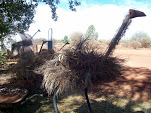I want to focus on research, not evaluation. Its not that I don't think evaluation is important, quite the opposite. Evaluation is an essential component of the strategic planning process and should be employed by everyone as a matter of good business practice. If a project or programme has specific objectives, including an aim or a vision, then the contribution of that project to those original aims should be evaluated so you can make a judgement about how successful it was.
But what I'm interested in focusing on is research.
According to the University of Western Australia, "research comprises creative work undertaken on a systematic basis in order to increase the stock of knowledge, including knowledge of humanity, culture and society, and the use of this stock of knowledge to devise new applications... it should have investigation as a primary objective and should have the potential to produce results that are sufficiently general for humanity's stock of knowledge (theoretical and/or practical) to be recognisably increased.”
To achieve this I'm suggesting that a reframing the language is needed. I want to determine the “role” of the arts in rural communities, rather than the “impact” of the arts on particular outcomes.
“ROLE” suggests that the arts forms an integral part in adapting to change and the aim of the researcher is as such to determine how and where the arts fits, among other factors, to contribute towards the social sustainability of rural Australia.
“IMPACT” implies that the arts is something which is external to rural life and should be administered in order to effect change, rather than work with what arts activity is already taking place.
My problem with evaluation masquerading as research is the ability to make generalisations based on those evaluations. All kinds of arts activities are going on all the time. The difficulties in measuring arts impact to date is not just that the arts is so extremely variable, but impacts are difficult to quantify because they are not so easily isolated among the myriad of other influences and interactions that take place whilst engaging in the arts. This includes the various nuances, personalities, environments specific to individual projects.
There is a need to build both a tool kit for evaluating and measuring outcomes for evaluation purposes, as well as building a sound research base on the role or the place of the arts in society.
.JPG)



